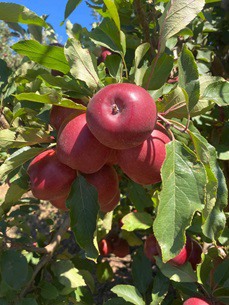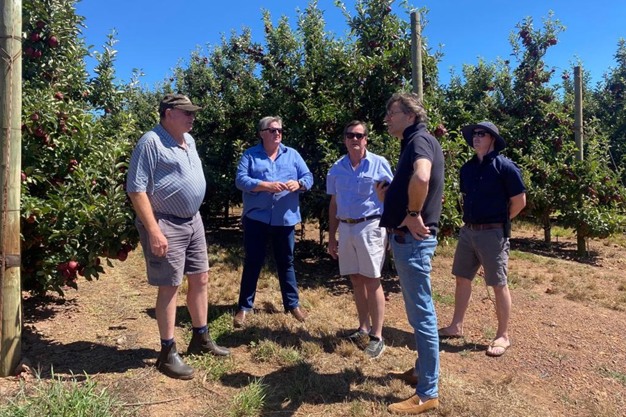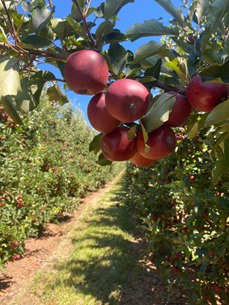 On Beaulieu Farm in Grabouw, one of the first farms to plant the Gala mutation Flash Gala nine years ago, topfruit farmer (and discoverer of Flash Gala's forebear, Corder Gala) Derek Corder says the South African industry continues to establish new orchards of the Bigbucks cultivar (right), of which around two and a half million trees have already been planted at this stage.
On Beaulieu Farm in Grabouw, one of the first farms to plant the Gala mutation Flash Gala nine years ago, topfruit farmer (and discoverer of Flash Gala's forebear, Corder Gala) Derek Corder says the South African industry continues to establish new orchards of the Bigbucks cultivar (right), of which around two and a half million trees have already been planted at this stage.
At Beaulieu, it is farmed to produce 105 to 110 tonnes per hectare (its yield can be substantially higher still, but that's not necessarily desirable).
"We feel it's been a great success. If you compare a Flash Gala to a normal Royal Gala, we think it's something exceptional," Corder says. "On this farm it's the most profitable crop."
The solid red colouration of the cultivar is so absolute that in the Ceres area, at a higher altitude than Grabouw, the Flash Gala can become almost completely black in a particularly cool year, he remarks.
"We don't plant for below 100 tonnes per hectare" "The biggest advantage is that the farmer and myself can make the decision on maturity," says Nico Ferreira, technical manager at Two-a-Day packhouse.
"The biggest advantage is that the farmer and myself can make the decision on maturity," says Nico Ferreira, technical manager at Two-a-Day packhouse.
"Whereas with Royal Gala you tell the pickers to only pick those with good colour. In this case we make the decision and it depends: the top of the tree varies from the bottom, the morning side versus the afternoon side. Once you've determined that, you can tell pickers to strip the bottom of the tree, for example, and leave the top."
They prefer to go through a Flash Gala orchard only once during harvest, whereas with the older Galas about 70% of the crop is picked first time around, with two, sometimes three more visits needed to clean up the inside of the tree.
"Our biggest challenge which we've had in the past is heat damage which is very difficult to see in the orchard for being a dark fruit. It manifests itself later in the pack shed. But we've now got infrared sensors in the packhouses that pick it up," Corder says.
The industry is going for high density planting, made possible with dwarfing rootstock . On a spacing of 3.5m x 1m they can add a thousand more trees per hectare (totalling 2857,700 trees per hectare).
"This is all pioneering work with rootstocks and interstems. We're still learning," Corder says and Ferreira adds: "We don't plant anything with an expectation of lower than 100 tonnes per hectare."
 Nico Ferreira, technical advisor at Two-a-Day and Conrad Fick, Tru-Cape marketing manager with apple farmer Derek Corder, Pieter Boekhout of Fresh Publishers and James Corder on the right
Nico Ferreira, technical advisor at Two-a-Day and Conrad Fick, Tru-Cape marketing manager with apple farmer Derek Corder, Pieter Boekhout of Fresh Publishers and James Corder on the right
Flash Gala global trials
There is high demand for Flash Gala plant material in India, and it's being evaluated in Italy and France to ascertain its relationship to the many other Gala strains, especially in the Tyrol. The United States, Chile, New Zealand and Australia have plant material and Flash Gala plant material is going to China as well.
The United States, Chile, New Zealand and Australia have plant material and Flash Gala plant material is going to China as well.
"There's a big demand for Flash Gala and it's increasing, especially in India, and South East Asia. The UK is traditionally our biggest Royal Gala market, so we tested the market last year with some experimental containers sent to UK and EU last year where it was marketed as Bigbucks. There was definitely an appetite for it and more will be going this year."
In the Far East and Middle East we're finding that this full colour is attracting a lot of attention.
Corder continues: "The same applies to our Fuji apples: we're trying to find redder strains all the time. With some of the newest strains of Pink Lady it's perhaps gone too far, losing some of its pink characteristics, but that's the name of the game: to plant improved strains." For more information:
For more information:
Tru-Cape
Tel: +27 21 850 1800
https://www.bigbucksapples.com/
